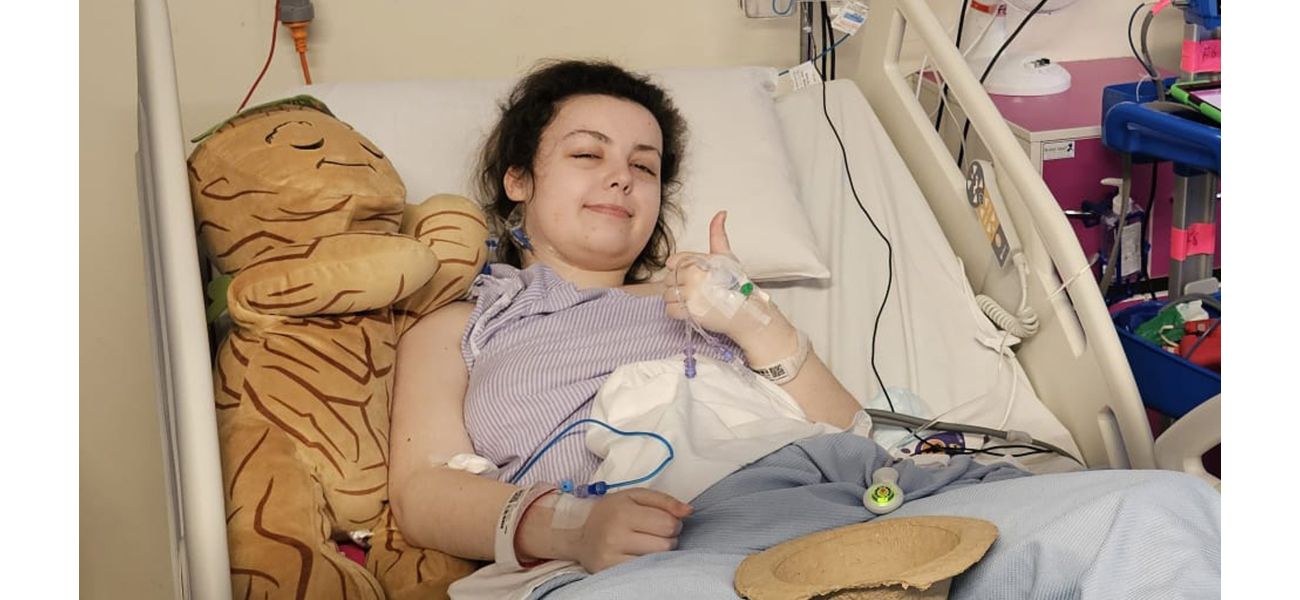I had constant bleeding for a year due to doctors deeming me too young.
I tried to continue as usual, but the bleeding persisted.
November 9th 2024.

It took me a whole two years to finally receive a proper diagnosis for my severe ulcerative colitis. Looking back, it seems like such a long and difficult journey, but at the time it felt never-ending. I remember walking into the A&E department and being asked by the doctor, "What brings you in today?" I was nervous and embarrassed as I explained, "Well… I've been experiencing bleeding when I go to the bathroom, and I don't think that's normal." It was 2021, and I was only 20 years old. Initially, I thought the blood was due to my Ehlers-Danlos Syndrome, a condition that causes my skin to tear easily. But as the symptoms worsened, I knew deep down that something else was going on. With a six-week wait to see my GP, I felt like A&E was my only option.
Unfortunately, my experience at A&E was not a pleasant one. After going through not one, but two pregnancy tests, the doctor finally did a rectal examination. He told me, "I can't see or feel any hemorrhoids, so I think that's all it is. It's typical for someone your age." He then proceeded to dismiss me, saying that if my symptoms continued for a year, then I could come back for further investigation. I couldn't believe it. I was being told that I was "far too young" to have anything serious going on. I left the hospital feeling like I had just wasted everyone's time. I tried to carry on as normal, but the bleeding didn't stop.
Looking back, I can't even begin to describe the relief I felt when I finally received a proper diagnosis. It took two whole years, but I finally had an answer. I was not making up my pain, and there was a reason behind all of it. I was diagnosed with severe ulcerative colitis, also known as IBD, which meant that my large intestine was dangerously inflamed. Despite repeatedly telling doctors that something was wrong, I was consistently dismissed. It felt like no matter where I turned, nobody believed me. This almost cost me my life on more than one occasion.
I've always had stomach issues, even as a child. I would go days without using the bathroom, and then suddenly, I would struggle to make it on time. During my teenage years, my symptoms eased, but in 2020, at the age of 19, they came back with a vengeance. And they only continued to get worse as time went on. I was experiencing incontinence, stomach cramping, and bleeding. It was a nightmare. I would wake up in the middle of the night, desperate for the toilet, feeling like someone had flicked a switch. I had no control, and as a 23-year-old, I found myself confined to my house, wearing adult nappies. It completely took over my life.
Throughout this whole process, I was constantly told by medical professionals that I was "too young to be sick" and that bad things don't happen to people my age. But I refused to give up. I pushed for help, and eventually, in April 2023, my GP agreed to run some tests. Initially, they were looking for cancer, but they soon widened their search to include bowel disorders. The results showed severe inflammation in my stool, and I ended up having a CT scan. The doctors told me, "You have extremely severe ulcerative colitis. Your entire colon is ulcerated and inflamed. We can't normally see it on a CT scan, but yours lit up like a Christmas tree." It was a mix of emotions for me, but the biggest one was relief. I finally had a proper diagnosis, and I wasn't making it all up.
From that point on, I was put on steroids and given iron infusions to help with the anemia caused by the constant bleeding. For months, I was constantly tapering doses of steroids, which helped relieve my symptoms but did not heal my bowel. Every time I would start to get better, doctors would try to take me off the steroids, and I would end up getting horribly sick again. After six months of this cycle, I had had enough. I sought a second opinion, and they quickly confirmed that I had a severe case of IBD and needed to start taking immunosuppressants. These drugs were strong derivatives of chemotherapy, and they caused my hair to fall out and my skin quality to plummet. It was a difficult time, and I was constantly being told that the drugs would start to work "after my next dose." But unfortunately, I was so ill that I never got to my next dose.
In February 2024, I developed what I thought was a winter vomiting bug. But it turned out to be much more than that. I ended up having sickness and diarrhea for three weeks straight. Finally, I couldn't take it anymore, and I went to A&E. I needed fluids and nutrition, and I was convinced that I would only be there for a night and then be on the road to recovery. But that's not how it happened.
IBD, or Inflammatory Bowel Disease, is a medical term used to describe conditions that can result in diarrhea and extreme stomach pain. It occurs when the immune system attacks the bowel, causing inflammation. The two main types are Crohn's disease and ulcerative colitis. While it is a long-term condition, there are treatments available to help manage the symptoms. If you want to learn more about IBD, you can find more information here.
It was a long and difficult journey, but I finally received the proper treatment I needed. I had an internal examination, and it revealed that my colon was completely shredded. I underwent a midline incision, where I was cut from my ribs all the way down to my navel. It was a tough recovery, but I was determined to get better. I am now on the road to recovery, but I am grateful for the lessons I have learned throughout this experience. I have learned to never give up on advocating for my health and to always trust my instincts. And most importantly, I have learned that age is just a number, and anyone can get sick, regardless of their age.
It was a long and difficult journey for Imali to finally be diagnosed with severe ulcerative colitis. She had been experiencing symptoms for two years before she was taken seriously and given the proper diagnosis. It all started when she went to the doctor in A&E, concerned about bleeding from her bottom. Despite her fears and embarrassment, she mustered up the courage to speak to the doctor about it.
After two pregnancy tests and a rectal examination, the doctor dismissed her symptoms as simply being hemorrhoids, which he believed were common for someone her age. Imali left feeling like she had wasted everyone's time, but her symptoms only got worse over time. She tried to carry on as normal, but the bleeding didn't go away.
It wasn't until two years later, after repeatedly telling doctors that something was wrong, that Imali was finally diagnosed with severe ulcerative colitis. This condition, also known as IBD, meant that her large intestine was dangerously inflamed. Despite her young age, Imali's symptoms were severe and nearly cost her her life multiple times.
Imali had always had stomach issues, but they had improved during her teen years. However, in 2020, they came back with a vengeance. She was constantly bleeding and struggling with incontinence and stomach cramps. It was like a switch had been flipped, and she had to go to the bathroom urgently and uncontrollably. As a young adult, it was embarrassing and limiting to her daily life.
Despite being told by medical professionals that she was "too young to be sick," Imali persisted in seeking help. It wasn't until she pushed for further tests that she was finally diagnosed with severe ulcerative colitis. Her colon was completely shredded, and she was immediately put on steroids and given iron infusions to help with her symptoms.
For months, Imali was constantly tapering doses of steroids, but they didn't heal her bowel, only provided temporary relief. She eventually sought a second opinion and was put on immunosuppressants, which had severe side effects such as hair loss and poor skin quality. Despite being told they would start to work soon, Imali's condition continued to worsen.
In February 2024, Imali thought she had a winter vomiting bug, but it turned out to be a severe flare-up of her ulcerative colitis. She ended up in A&E, needing fluids and nutrition to survive. It was a long and difficult road to her diagnosis, but Imali finally had some answers and could start proper treatment for her condition.
Ulcerative colitis is a chronic condition that causes inflammation in the bowel, leading to symptoms such as diarrhea and extreme stomach pain. It is one of the two main types of IBD, along with Crohn's disease. While there is no cure for IBD, symptoms can be managed with various treatments. It is important to seek medical help if you experience any concerning symptoms, as early diagnosis and treatment can greatly improve your quality of life.
Unfortunately, my experience at A&E was not a pleasant one. After going through not one, but two pregnancy tests, the doctor finally did a rectal examination. He told me, "I can't see or feel any hemorrhoids, so I think that's all it is. It's typical for someone your age." He then proceeded to dismiss me, saying that if my symptoms continued for a year, then I could come back for further investigation. I couldn't believe it. I was being told that I was "far too young" to have anything serious going on. I left the hospital feeling like I had just wasted everyone's time. I tried to carry on as normal, but the bleeding didn't stop.
Looking back, I can't even begin to describe the relief I felt when I finally received a proper diagnosis. It took two whole years, but I finally had an answer. I was not making up my pain, and there was a reason behind all of it. I was diagnosed with severe ulcerative colitis, also known as IBD, which meant that my large intestine was dangerously inflamed. Despite repeatedly telling doctors that something was wrong, I was consistently dismissed. It felt like no matter where I turned, nobody believed me. This almost cost me my life on more than one occasion.
I've always had stomach issues, even as a child. I would go days without using the bathroom, and then suddenly, I would struggle to make it on time. During my teenage years, my symptoms eased, but in 2020, at the age of 19, they came back with a vengeance. And they only continued to get worse as time went on. I was experiencing incontinence, stomach cramping, and bleeding. It was a nightmare. I would wake up in the middle of the night, desperate for the toilet, feeling like someone had flicked a switch. I had no control, and as a 23-year-old, I found myself confined to my house, wearing adult nappies. It completely took over my life.
Throughout this whole process, I was constantly told by medical professionals that I was "too young to be sick" and that bad things don't happen to people my age. But I refused to give up. I pushed for help, and eventually, in April 2023, my GP agreed to run some tests. Initially, they were looking for cancer, but they soon widened their search to include bowel disorders. The results showed severe inflammation in my stool, and I ended up having a CT scan. The doctors told me, "You have extremely severe ulcerative colitis. Your entire colon is ulcerated and inflamed. We can't normally see it on a CT scan, but yours lit up like a Christmas tree." It was a mix of emotions for me, but the biggest one was relief. I finally had a proper diagnosis, and I wasn't making it all up.
From that point on, I was put on steroids and given iron infusions to help with the anemia caused by the constant bleeding. For months, I was constantly tapering doses of steroids, which helped relieve my symptoms but did not heal my bowel. Every time I would start to get better, doctors would try to take me off the steroids, and I would end up getting horribly sick again. After six months of this cycle, I had had enough. I sought a second opinion, and they quickly confirmed that I had a severe case of IBD and needed to start taking immunosuppressants. These drugs were strong derivatives of chemotherapy, and they caused my hair to fall out and my skin quality to plummet. It was a difficult time, and I was constantly being told that the drugs would start to work "after my next dose." But unfortunately, I was so ill that I never got to my next dose.
In February 2024, I developed what I thought was a winter vomiting bug. But it turned out to be much more than that. I ended up having sickness and diarrhea for three weeks straight. Finally, I couldn't take it anymore, and I went to A&E. I needed fluids and nutrition, and I was convinced that I would only be there for a night and then be on the road to recovery. But that's not how it happened.
IBD, or Inflammatory Bowel Disease, is a medical term used to describe conditions that can result in diarrhea and extreme stomach pain. It occurs when the immune system attacks the bowel, causing inflammation. The two main types are Crohn's disease and ulcerative colitis. While it is a long-term condition, there are treatments available to help manage the symptoms. If you want to learn more about IBD, you can find more information here.
It was a long and difficult journey, but I finally received the proper treatment I needed. I had an internal examination, and it revealed that my colon was completely shredded. I underwent a midline incision, where I was cut from my ribs all the way down to my navel. It was a tough recovery, but I was determined to get better. I am now on the road to recovery, but I am grateful for the lessons I have learned throughout this experience. I have learned to never give up on advocating for my health and to always trust my instincts. And most importantly, I have learned that age is just a number, and anyone can get sick, regardless of their age.
It was a long and difficult journey for Imali to finally be diagnosed with severe ulcerative colitis. She had been experiencing symptoms for two years before she was taken seriously and given the proper diagnosis. It all started when she went to the doctor in A&E, concerned about bleeding from her bottom. Despite her fears and embarrassment, she mustered up the courage to speak to the doctor about it.
After two pregnancy tests and a rectal examination, the doctor dismissed her symptoms as simply being hemorrhoids, which he believed were common for someone her age. Imali left feeling like she had wasted everyone's time, but her symptoms only got worse over time. She tried to carry on as normal, but the bleeding didn't go away.
It wasn't until two years later, after repeatedly telling doctors that something was wrong, that Imali was finally diagnosed with severe ulcerative colitis. This condition, also known as IBD, meant that her large intestine was dangerously inflamed. Despite her young age, Imali's symptoms were severe and nearly cost her her life multiple times.
Imali had always had stomach issues, but they had improved during her teen years. However, in 2020, they came back with a vengeance. She was constantly bleeding and struggling with incontinence and stomach cramps. It was like a switch had been flipped, and she had to go to the bathroom urgently and uncontrollably. As a young adult, it was embarrassing and limiting to her daily life.
Despite being told by medical professionals that she was "too young to be sick," Imali persisted in seeking help. It wasn't until she pushed for further tests that she was finally diagnosed with severe ulcerative colitis. Her colon was completely shredded, and she was immediately put on steroids and given iron infusions to help with her symptoms.
For months, Imali was constantly tapering doses of steroids, but they didn't heal her bowel, only provided temporary relief. She eventually sought a second opinion and was put on immunosuppressants, which had severe side effects such as hair loss and poor skin quality. Despite being told they would start to work soon, Imali's condition continued to worsen.
In February 2024, Imali thought she had a winter vomiting bug, but it turned out to be a severe flare-up of her ulcerative colitis. She ended up in A&E, needing fluids and nutrition to survive. It was a long and difficult road to her diagnosis, but Imali finally had some answers and could start proper treatment for her condition.
Ulcerative colitis is a chronic condition that causes inflammation in the bowel, leading to symptoms such as diarrhea and extreme stomach pain. It is one of the two main types of IBD, along with Crohn's disease. While there is no cure for IBD, symptoms can be managed with various treatments. It is important to seek medical help if you experience any concerning symptoms, as early diagnosis and treatment can greatly improve your quality of life.
[This article has been trending online recently and has been generated with AI. Your feed is customized.]
[Generative AI is experimental.]
0
0
Submit Comment





